Systematic Documentation of Traditional Knowledge related to Plants used for Food and Ayush & Indigenous Medicine (Project funded by Ministry of Ayush)
Under Central Sector Scheme of Ministry of AYUSH, Government of India sanctioned to Kerala State Council for Science Technology and Environment implemented by KSCSTE-Jawaharlal Nehru Tropical Botanic Garden and Research Institute
Journal of Traditional and Folk Practices
About the Project
Some of the significance of TK are; it is directly linked to the cultural heritage of the people, handed over from generation to generation with more than 80% of the livelihood needs of the world’s poor directly or indirectly depending on the use of biological/ non-biological resources and associated TK. TK is getting eroded rapidly because of the changing life style of the people and environment and hence, there is an urgent need to document such valuable information for the welfare and betterment of posterity. Bio-prospecting of plants used for food and medicine is an important area of research for developing diverse novel products which are essentially required for taking care of human health. The role of TK is important for obtaining leads, to evaluate medicinal and food value of plants and these leads will further help to make therapeutically active formulations which are commercially viable. Technology transfer of these products will further ensure their commercialization and benefit sharing with the knowledge providers.
Kerala, the southernmost tip of the Indian sub-continent is considered as the home land of the most diverse and richest traditional knowledge systems because of its unique cultural expressions which are directly or indirectly connected with environment, ecology, biodiversity, etc., ranging from coastal, and plains to mountainous regions. This varied and diverse topography is the result of the typical climate, edaphic factors and physio-geographic conditions which in turn resulted in a rich variety and variability of flora and fauna, especially the plants used for food and medicine. Medicinal and Aromatic plant wealth of Kerala is immensely rich and diverse and has attracted the attention of traders from all over the world.
The diversity that occurs in the flora and fauna has played a major role for evolving a unique Classical Health Tradition (CHT) and Oral Health Tradition (OHT) in Kerala. Since time immemorial, traditional Vaidyas (Physicians) of Kerala have been utilizing the location specific edible/medicinal plants. They administered various effective drugs made from these plants for Primary Health Care and also effectively applied them for treating various ailments, both acute and chronic in nature.
Current studies of Kerala State Council for Science, Technology and Environment (KSCSTE) reveal that the Traditional Knowledge (TK) from the oral health traditions especially the plants used for food and medicine in Kerala is getting depleted. A well designed mechanism is to be brought out to codify such knowledge systems at the earliest; otherwise this valuable knowledge will be lost forever. Therefore, systematic documentation of TK at Gramapanchayath level is highly essential to save the TK existing in the oral tradition. This will further lead to establish Traditional Knowledge based R & D activities with a view to develop novel herbal products and nutraceuticals for the benefit of ailing humanity. Alternatively, this knowledge can also be effectively utilized for enriching Ayurvedic Pharmacopoeia as it was practiced in the past by the ancient Ayurvedic scholars.
Keeping this in view, the project ‘Systematic Documentation of Traditional Knowledge (TK) related to Plants used for Food, AYUSH and Indigenous Medicine’ was implemented in association with KSCSTE-Jawaharlal Nehru Tropical Botanic Garden and Research Institute, formerly known as TBGRI, one of the premier research institutes functioning under Kerala State Council for Science, Technology and Environment (KSCSTE), Government of Kerala. The expertise has been drawn mainly from the Ethnomedicine & Ethnopharmacology Division of KSCSTE-JNTBGRI. And the project is funded by the Ministry of AYUSH, Government of India.
The major objectives of the project were;
- To disseminate the importance of documenting the Traditional Knowledge (TK) associated with biodiversity to the knowledge holders and the public through implementing contact and awareness programmes followed by personal contacts, organizing discussions, small seminars and workshops.
- Field survey, collection, inventory and systematic documentation of Traditional Knowledge/Practices,
- Data pooling study, analysis and organization of data
- Preparation of video films and database and digitization of Traditional and Folk Practices
- Dissemination of documented knowledge to AYUSH Doctors through workshops
- Publication of Annual Journal of Traditional and Folk Practices
- Publication of scientific books and IEC materials.
- Publication of Annual report of the activities and achievements of centre
- Training of AYUSH Doctors on Traditional/Folk Practices.
SUMMARY OF THE WORK
- Phase I/First year (completed)
- Phase II/Second year(continuing)
- Phase III/Third year (upcoming)
Phase I/First year
Activity 1: Organization of Small Workshops, Contact Programmes on Health Awareness
Trained and approved HRD conducted contact and awareness programmes including small workshops/seminars, aimed at establishing closer ties and interaction with the elected local body members and traditional knowledge holders with a view to establish an excellent rapport with them for the smooth documentation in the selected 98 Gramapanchayaths of Kerala state.
|
Ernakulam District |
||||
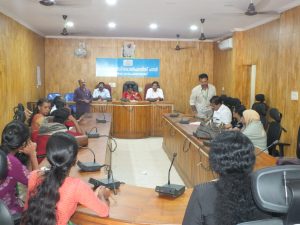 |
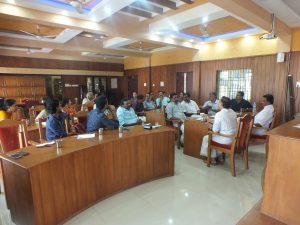 |
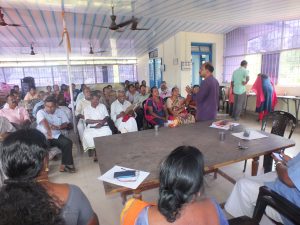 |
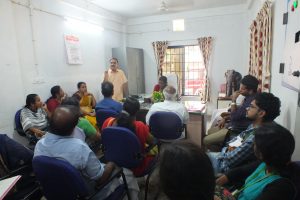 |
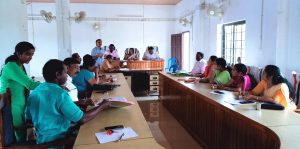 |
| Vengola Gramapanchayth | Puthenvelikkara Gramapanchayath | Njarakkal Gramapanchayth | Koovappady Gramapanchayth | Chottanikara Gramapanchayath |
| Kannur | ||||
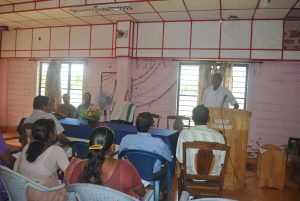 |
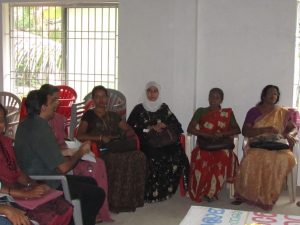 |
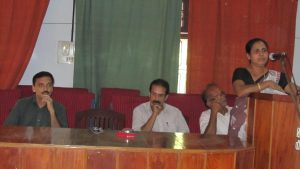 |
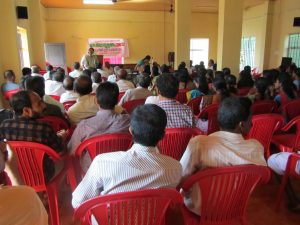 |
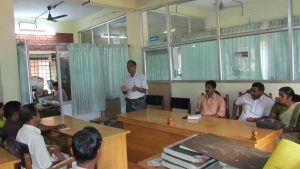 |
| Cherukunnu Gramapanchayath | Malapattam Gramapanchayath | Munderi Gramapanchayath | Muzhakunnu Gramapanchayth | Peravoor Gramapanchayath |
| Kasargode | ||||
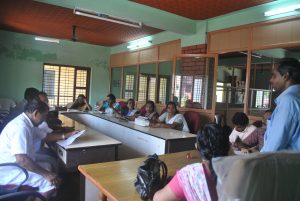 |
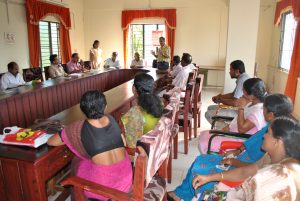 |
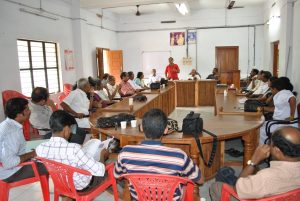 |
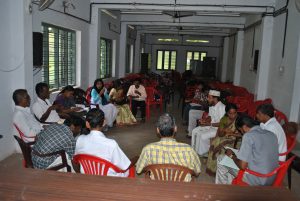 |
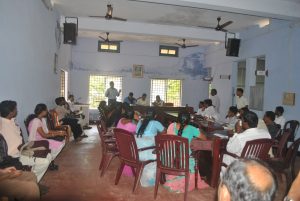 |
| Contact and Awareness programme held at Kayyur-Cheemeni Gramapanchayath | Seminar held at Cheruvathur Gramapanchayath | Seminar held at Pilicode Gramapanchayath | Workshop held at Ajanur Gramapanchayath | Workshop held at Thrikkaripur Gramapanchayath |
| Kozhikode | ||||
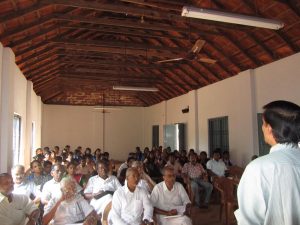 |
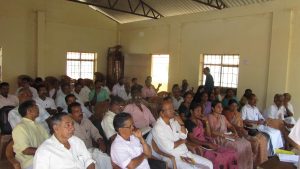 |
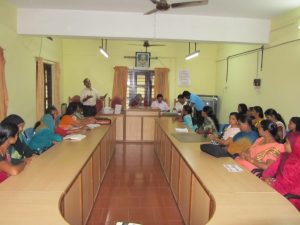 |
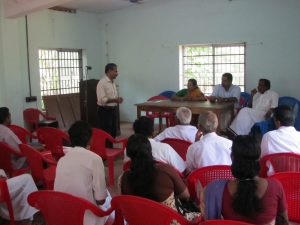 |
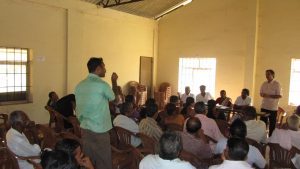 |
| Awareness programme oraganized at Maniyur Gramapanchayath | Meeting at Ayancheri Gramapanchayath | Seminar held at Puthuppadi Gramapanchayath | Seminar organized at Namanda Gramapanchayath | Workshop held at Ayancheri Gramapanchayath |
| Malappuram | ||||
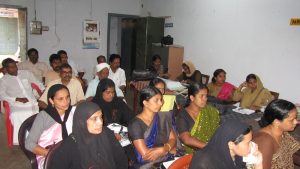 |
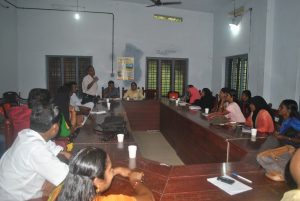 |
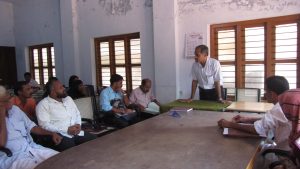 |
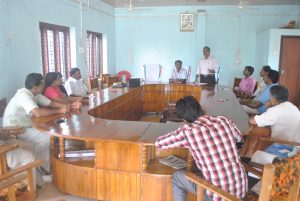 |
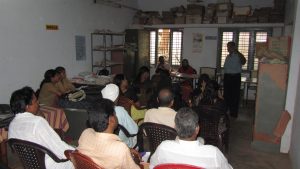 |
| Audiance at Keezhattur Gramapanchayath | Awareness programme held at Kalikavu Gramapanchayath | Intraction with local people at Edavanna Gramapanchayath | Awareness programme held at Kalikavu Gramapanchayath | Workshop held at Keezhattur Gramapanchayath |
| Palakkad | ||||
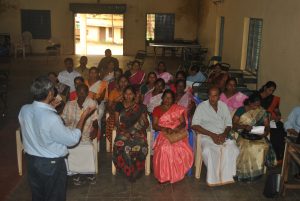 |
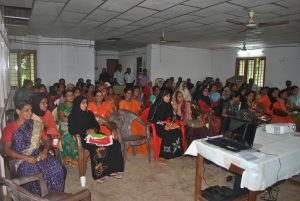 |
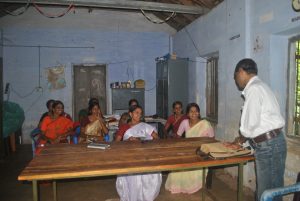 |
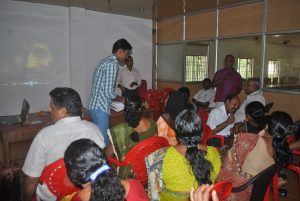 |
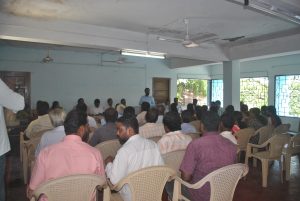 |
| Agali Gramapanchayth | Alanallur Gramapanchayath | Eruthenpathy Gramapanchayath | Karimba Gramapanchayath | Pattancheri Gramapanchayath |
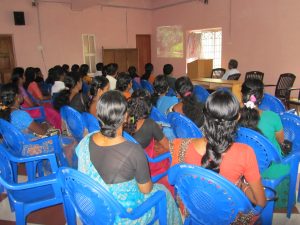 |
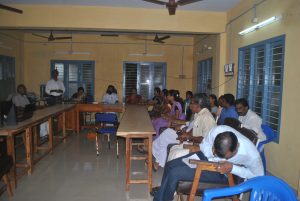 |
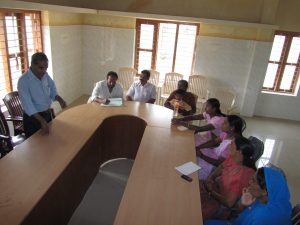 |
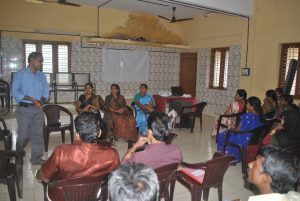 |
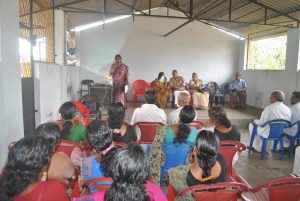 |
| Perigottukurussi Gramapanchayath | Perumatti Gramapachayath | Sholayur Gramapachayath | Thrikaderi Gramapanchayath | Thrithala Gramapanchayath |
| Thrissur | |||
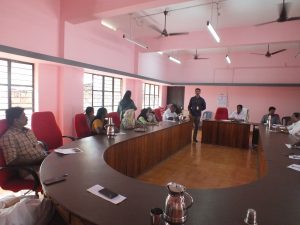 |
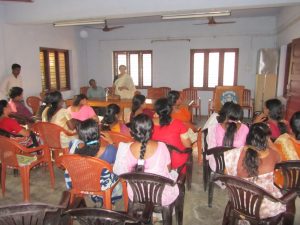 |
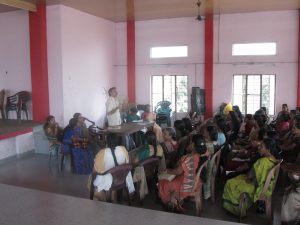 |
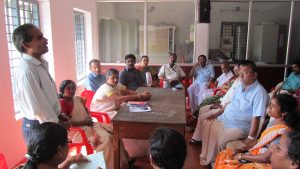 |
| Awareness programme held at Panjal Gramapanchayath | Chelakkara Gramapanchayath | Kolazhi Gramapachayath | Tholur Gramapanchayath |
| Wayanad | ||||
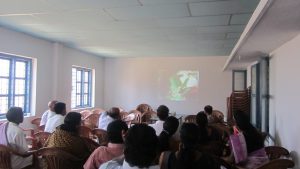 |
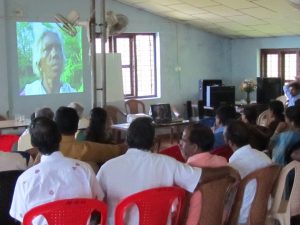 |
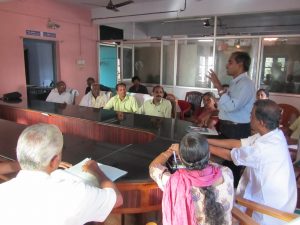 |
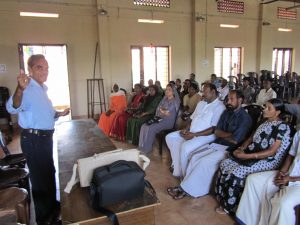 |
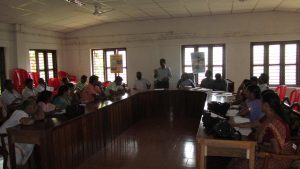 |
| Awareness programme held at Ambalavayal Gramapanchayath | Awareness programme held at Mullenkolly Gramapanchayath | Interaction with local people at Thariyode Gramapanchayath | Meeting held at Meppadi Gramapanchayath | Seminar held at Noolpuzha Gramapanchayath |
Activity 2: Field survey, Collection, and Documentation of Traditional Practices
In the first year of the project, the research team successfully carried out field level systematic documentation of TK from the oral tradition (primary data) in 98 Gramapanchayaths, interviewed 3255 (461 tribes and 2794 non-tribes) knowledge providers and documented a total of 26419 information after signing the Prior Informed Consent (PIC) to ensure Access and Benefit Sharing (ABS). Out of this, 3392 (12.84%) information were recorded from different tribal communities and 23027(87.16%) were documented from non-tribal communities of various districts brought under the study. Based on the study carried out, passport script data of 750 case studies related to medicinal and food plants have been prepared.
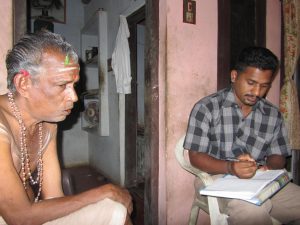 |
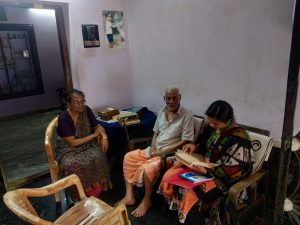 |
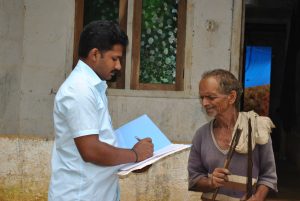 |
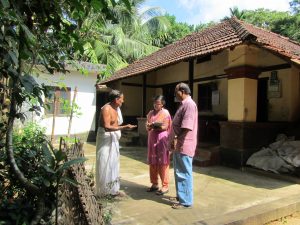 |
| Data documentation from Muzhakunnu, Kannur | Discussion and sharing of traditional literature with informants | Documentaion of data from the infromant | Documentation of Traditional medicinal practices form Mr. Pokkan Vaidyar, Thrikaripur, Kasaragod |
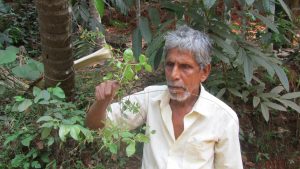 |
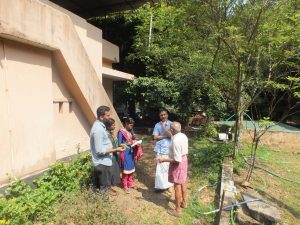 |
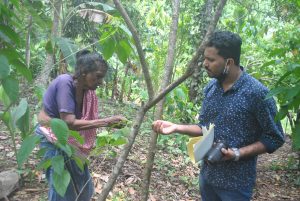 |
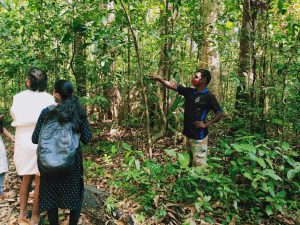 |
| Explaining the medicinal plants used for the treatment by Mr. Aboobakker Pezhungadan at Malappuram | Field acquaintance of plants used for the treatment by the traditional practitioner | Field exploration with the informant, Mrs. Jagadhamma at Vithura Gramapanchayath, Thiruvananthapuram | Forest exploration with Mr. Sasikuttan at Kulathupuzha Gramapanchayth, Kollam |
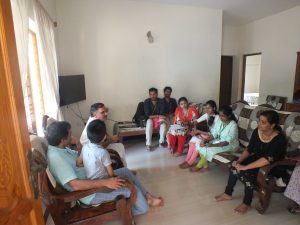 |
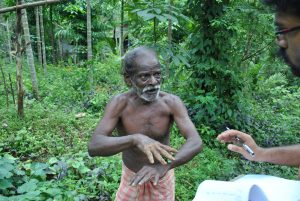 |
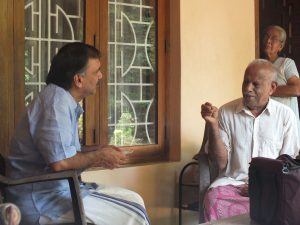 |
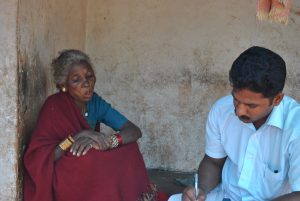 |
| Group discussion and interaction with informant at Puthenvelikkara, Ernakulam | Informant, Mr. Elumban explaning the medicinal practice at Kinanoor Gramapanchayath, Kasargod | Interaction with Dr. B Paulose at Vengola Gramapanchayath, Ernakulam | Interaction with Kaali, tribal knowledge provider from Edavaka Gramapanchayath, Wayanad |
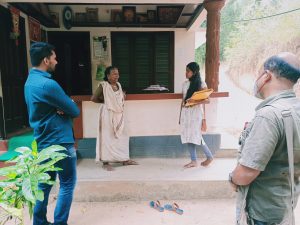 |
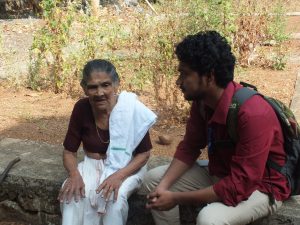 |
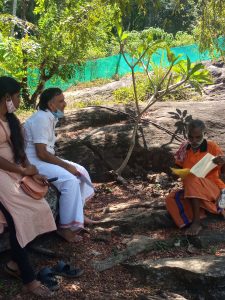 |
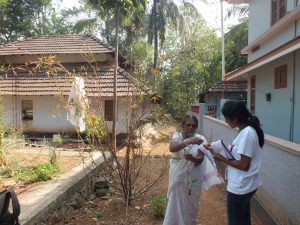 |
| Interaction with Padma Shri Lekshmikutty Amma | Interaction with the informant at Panjal Gramapanchayath, Thrissur | Interaction with the Traditional Kani Tribal Healer, Mr. Pachankanni at Amboori Gramapanchayath | Interview and field exploration of medicinal plants at Panjal Gramapanchayth, Thrissur |
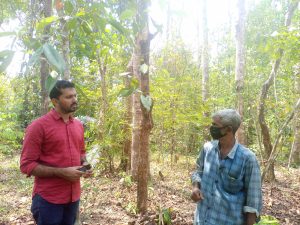 |
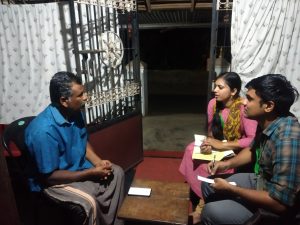 |
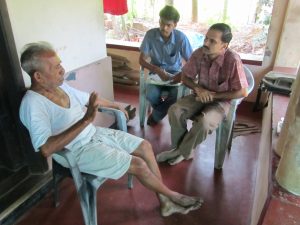 |
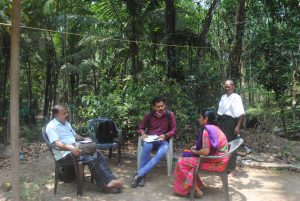 |
| Interview and field exploration with Mr. Gopi at Chithara Gramapanchayath, Kollam | Interview with Mr Jayakumar at Erumapetty Gramapanchayath, Thrissur | Interview with Mr. Mallan Narayanan at Cherukkunnu Gramapanchayath, Kannur, Kerala | Interview with Mrs. Laitha S at Peringammala Gramapanchayath, Thiruvananthapuram |
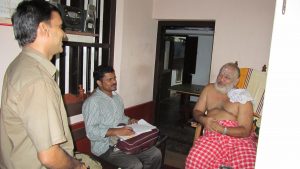 |
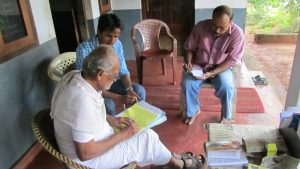 |
||
| Interviwe with Mr. Ganapathi K C at Chirakkel, Kannur | Signing the Prior Informed Consent Form by the informant |
Activity 3: Data pooling, study, analysis and organization of data
This activity is divided into 3 parts. In the first part the data pooling study, detailed analysis and organization of data based on the systematically documented Traditional Knowledge related to Plants used for Food and AYUSH & Indigenous medicine from the 70 Gramapanchayaths and brief analysis of the 28 Gramapanchayaths are described. In the second part, the analysis data based on diseases and diseased conditions are given. And in the third part, 20 Folk/Traditional medical interventions and food practices have been included. The information related to Folk/Traditional Medicinal plants have been given in the Activity 2 under passport script data of 750 medicinal plants.
Activity 4: Preparation of Video films and database and digitization of Traditional/ Folk Practices
As part of the documentation of the traditional knowledge related to plants used for food and AYUSH & Indigenous medicine, selected video documentation was carried out in Alappuzha, Thrissur, Palakkad and Malappuram districts. 24 selected sequences were taken based on the importance and relevance of the content and information imparted during the field visit. Web based database software was created with technical support from C-DIT, Government of Kerala for digitally documenting the data collected as part of the Systematic Documentation of Traditional Knowledge related to Plants used for Food and AYUSH & Indigenous Medicine. This web based information system provides user friendly, fast and hassle free data retrieval and management of documented data in the most effective & scientific manner and also for digitizing and data pooling of the data documented during the project period. The software has been developed using versions of PHP and MySQL.
Activity 5: Dissemination of documented knowledge to AYUSH doctors through workshops
One day workshops on ‘Learning from Traditional Knowledge’ exclusively for AYUSH doctors was conducted with an objective to disseminate the importance and value of Traditional knowledge related to the location specific Medicinal and Food plant species used in the oral health tradition by the folk and tribal healers of respective districts to AYUSH doctors. Four workshops were conducted at Kasaragod, Kannur, Kozhikode and Wayanad districts of Kerala with a total of 145 AYUSH doctors. The workshop was organized in association with the Department Indian Systems of Medicine(ISM), Government of Kerala. Dr. Anitha Jacob, Director, ISM issued an official circular to the respective District Medical Officers (ISM) to nominate Medical Officers working in the districts to participate in the workshop organized by KSCSTE/TBGRI. Apart from the Government Medical Officers (ISM), Ayurveda Medical Association of India (AMAI) also nominated representatives from the private sector. Printed IEC materials entitled ‘Learning from Traditional Knowledge’ were distributed to AYUSH doctors to get an idea about the subject that was proposed to be discussed in the workshop.
Activity 6: Publication of annual Journal of Traditional and Folk Practices
As a part of the activity, Journal entitled ‘Journal of Traditional and Folk Practices’ was published. This journal will publish peer reviewed original research and review articles in the areas of: Traditional Knowledge (TK) related to food and medicine, Research/review papers/case studies based on classical and oral health traditions, healing art of tribal communities, traditional food recipes (seasonal, geographical, cultural, etc.), ethnomedicine, ethnobiology, ethnobotany, ethnopharmacology, ethnozoology, ethnoveterinary, pharmacology, phytochemical studies based on TK, Drug and nutraceutical development based on TK, Protection of TK, Intellectual Property Rights (IPR), vrikshayurveda, bioprospecting of medicinal plants and product development through biotechnological interventions. A Editorial Advisory Committee, Editorial board members, Chief Executive Editor, Executive Editor, Editor, Associated Editors and Assistant Editors for the journal was constituted and published the inaugural issue of the Journal Volume 1 Number 1 January 2013.
Activity 7: Publication of Scientific books and IEC materials
Under this activity, one book and four IEC materials were published.
Activity 8: Publication of Annual reports
The initial progress report was submitted to the Ministry of AYUSH, formerly known as Department of AYUSH in the month of October, 2010. The first year annual report of the project was submitted to the Council and Ministry of AYUSH, Govt. of India. About 5 publications were published as a part of the project.
Activity 9: Training of AYUSH Doctors on Traditional/Folk Practices
Two training programmes were organized exclusively for the AYUSH doctors at Jawaharlal Nehru Tropical Botanical Garden and Research Institute (KSCSTE-JNTBGRI) with a view to create awareness on the subject, ‘Traditional and Folk practices – contemporary relevance and future prospects’. The training programme for the first batch was conducted from 24-25, August 2011 and the second batch training was organized from 26-27, August 2011. A total of 60 AYUSH doctors representing from Kasaragod, Wayanad, Kannur, Kozhikode, Kollam and Thiruvananthapuram districts participated in the programmes. The training programme was to exchange knowledge available from the oral health tradition which is not mentioned in the classical traditions like Ayurveda, Yoga and Naturopathy, Homoeopathy Siddha and Unani. Symbiotic relationship between classical tradition and oral health tradition was also brought under detailed discussion as part of the training programme. Selected Tribal healers from Thiruvananthapuram and Wayanad districts were invited and a special session was organized for exchanging the knowledge between the participants of two traditions.
Major achievements of the Centre in the First Year of the Project
- Successfully organized contact and awareness programme including small workshops and seminars at 98 Gramapanchayaths of Kasaragod, Kannur, Kozhikode, Wayanad, Malappuram, Palakkad and Thrissur districts of Kerala state.
- Through the implementation of Activity 1, dissemination extended to more than ten thousand people including elected local body members, knowledge holders on the subject – Biodiversity and associated TK, importance of sector wise TK especially knowledge related to plants used for food and medicine, necessity for the preparation of Gramapanchayath wise Biodiversity Register and its protection and utilization, the role of PIC for the protection and ownership rights of TK, the role PIC in ABS, basic knowledge on conventional IPR regime, protection of TK under Sui generis system, the role of database for the protection of TK and ABS, scope of conducting research based on TK and its potential for developing novel herbal drugs, modern medicine, nutraceuticals and other plant based products and also demonstrated the uses of locally available medicinal and food plants for primary healthcare.
- Encouraged/motivated the healers to preserve their rich traditional heritage for future generations.
- Successfully completed the systematic documentation of Traditional Knowledge related to plants used for food and AYUSH & Indigenous medicine of 98 Gramapanchayaths
- Introduced Prior Informed Consent (PIC).
- Interviewed 3255 (461 tribes and 2794 non-tribes) knowledge providers and documented a total of 26419 information. Out of which 3392 (12.84%) recorded from different tribal communities and 23027(87.16%) documented from non-tribal communities of various districts brought under the study.
- The achievement of the third activity includes data pooling, analysis and organization of field data documented from 98 Gramapanchayaths. Based on the single drugs we had documented 14684 information (tribal – 1839 and non-tribal – 12845) and in the poly herbal formulations, 8852information (tribal – 855 and non-tribal – 7997) were documented. Similarly, under the food category 2883 information (tribal – 708 and non-tribal – 2175) has been recorded and documented.
- Carried out the data analysis of diseases and diseased conditions prepared based on the data systematically documented and pooled from 70 Gramapanchayaths aimed to project the district wise utility pattern of medicinal plants either alone or in combination for treating diseases and diseased conditions.
- Presented 20 selected case studies of Folk / Traditional Medical interventions and Food practices prevalent in Kerala.
- The script writing of one hour duration documentary film on Traditional Knowledge related to Plants used for Food and AYUSH & Indigenous Medicine is in the final stage and will be released shortly.
- Successfully developed software which is intended to create a new web-based database system for preparing electronic database and digitizing the data collected for the project entitled “Systematic Documentation of Traditional Knowledge related to Plants used for Food, AYUSH & Indigenous Medicine”.
- Successfully conducted one day workshop on ‘Learning from Traditional Knowledge’ exclusively for AYUSH doctors with an objective to disseminate the importance and value of Traditional knowledge to AYUSH doctors at four districts of Kerala.
- Publication of the Journal entitled ‘Journal of Traditional and Folk Practices’ is in the final stage and the first issue will be released shortly.
- ‘Student’s Handbook on Medicinal and Food Plants’ is ready for publication.
- Published a book entitled ‘Traditional and Folk practices – Contemporary relevance and future prospects’ as part of the training programme extended to AYUSH Doctors.
- Three publications related to IEC materials is in the final stage and will be published shortly.
- Successfully organized two training programmes to AYUSH doctors on Traditional/Folk practices at JNTBGRI on the subject ‘Traditional and Folk practices – contemporary relevance and future prospects’.
Phase II/ Second Year
Activity 1: Organization of Small Workshops, Contact Programmes on Health Awareness
Trained and approved HRD conducted contact and awareness programmes including small workshops/seminars, aimed at establishing closer ties and interaction with the elected local body members and traditional knowledge holders with a view to establish an excellent rapport with them for the smooth documentation in the selected 50 Gramapanchayaths of Kerala state.
Activity 2: Field survey, Collection, and Documentation of Traditional Practices
The second phase of the project was implemented on November 2019. Field level systematic documentation of TK related to plants used for food and AYUSH & Indigenous medicine was conducted in 7 Gramapanchayaths of Thrissur, Ernakulam, Kollam and Thiruvananthapuram districts of Kerala State. The total number of informants interviewed in the second year of the project was 1202 and documented a total of 9034 information after signing the Prior Informed Consent (PIC) to ensure Access and Benefit Sharing (ABS). Out of this, 675 information were recorded from different tribal communities and 8359 were documented from non-tribal communities of various districts brought under the study. Based on the study carried out, passport script data of 20 case studies related to medicinal and food plants have been prepared. Collection and documentation of 242 traditional practices (157 single drugs and 85 poly herbal formulations) as per LHT format have been completed for 20 selected Gramapanchayaths of Kerala.
Activity 3: Data Pooling and Data Analysis
This activity is divided into 3 parts. In the first part the data pooling study and data analysis is based on the systematically documented Traditional Knowledge related to Plants used for Food and AYUSH & Indigenous medicine from the 50 Gramapanchayaths and brief analysis of the 50 Gramapanchayaths are documented and data pooling and analysis were done. In the second part, the analysis data based on diseases and diseased conditions was done. The achievement of the third activity includes data pooling, analysis and organization of field data documented from 50 Gramapanchayaths. Based on the single drugs, documented 4761 information (tribal – 417 and non-tribal – 4344) and in the poly herbal formulations, 3344 information (tribal – 183and non-tribal – 3161) were documented. Similarly, under the food category 918 information (tribal – 74 and non-tribal – 844) have been recorded and documented. And in the third part, 20 Folk/traditional medical interventions and 20 folk/traditional medicinal plants have been prepared.
Activity 4: Preparation of Video films, Database and Digitization of Traditional/ Folk practices
Under Activity 4, due to COVID -19 restrictions and lockdown in Kerala could not carry out the video documentation so far. The process for video documentation is on and is expected to be carried out soon.
Web based database software was created with technical support from C-DIT, Government of Kerala for digitally documenting the data collected as part of the Systematic Documentation of Traditional Knowledge related to Plants used for Food and AYUSH & Indigenous Medicine. To make the software more robust and agile, the existing software is updated using the latest technology (using PHP 8 and MySQLi) in order to make the application compatible with the latest browsers. By updating the software we can retrieve: Information on number of healers/ knowledge holders interviewed, total information documented on medical/ food plants, details of plants used for medicine/food, total number of information documented, total number of plant species used as single/combination drugs, total number of food plant species used, etc., can be generated from the database software. Passport script data of plants used for single/polyherbal formulation and food can also be generated.
A website for the project has been developed with the technical support from C-DIT, Government of Kerala (https://www.webtestingonline.com/tbgri) and also hosted in KSCSTE official website (/ayush_project/).
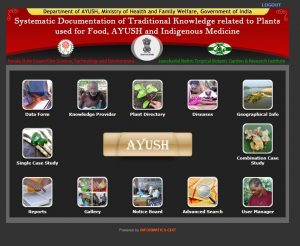
Activity 5: Annual Journal of Traditional and Folk Practices
Journal of Traditional and Folk Practices (JTFP) is jointly published by Kerala State Council for Science Technology and Environment (KSCSTE) and Jawaharlal Nehru Tropical Botanic Garden and Research Institute (JNTBGRI), funded by Ministry of AYUSH, Government of India, under the Central Sector Scheme for upgradation to Centers of Excellence. JTFP is published biannually and publishes peer reviewed original research and review articles including case studies on Traditional and Folk Practices. JTFP is UGC approved Journal (https://ugccare.unipune.ac.in).The volume has twelve articles related to the subject areas of ethnobotany, traditional knowledge, pharmacognosy, phytochemistry, ethnobiology, ethnomedicine and folk customs. Volume 7(1&2) & 8(1) June 2020 and Volume 8(2) December 2020 issues of the Journal of Traditional and Folk Practices have been published. The Volume 9 (1) June 2021 issue with 12 peer reviewed articles is ready for publication.
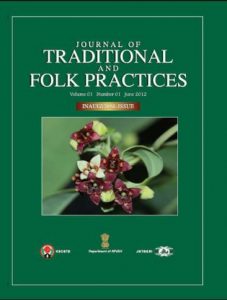 |
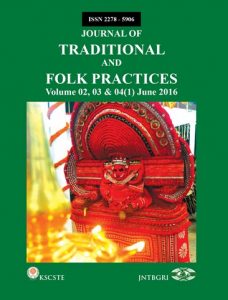 |
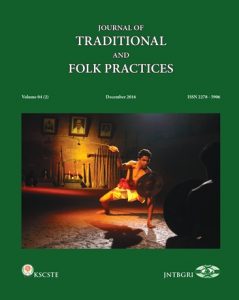 |
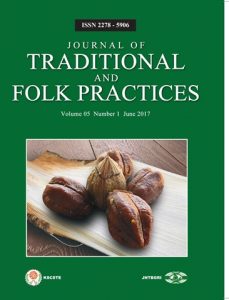 |
| JTFP cover pages_01 JUne 2012 | JTFP cover pages_2,3,4(1) June 2016 | JTFP cover pages_4(2) December 2016 | JTFP cover pages_5(1) June 2017 |
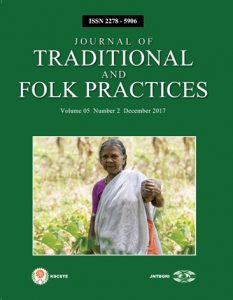 |
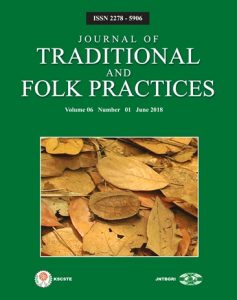 |
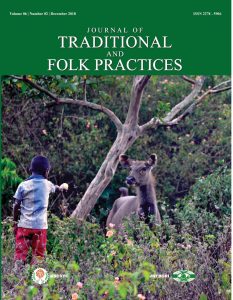 |
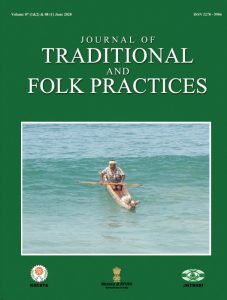 |
| JTFP cover pages_5(2) December 2017 | JTFP cover pages_6(1) June 2018 | JTFP cover pages_6(2) December 2018 | JTFP_Volume 7(1&2) & 8(1) June 2020 |
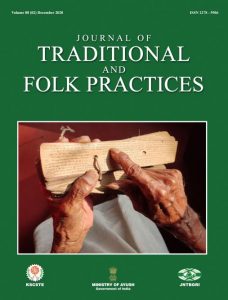 |
|||
| Volume 8(2) December 2020 |
Activity 6: Publication of Annual Reports
Publication of annual report of the activities and achievements of the Centre is in progress.
Activity 7: Interaction with AYUSH Doctors on Traditional/Folk Practices
- The main objective of the training programme was to exchange knowledge available from the oral health tradition which is not mentioned in the classical traditions like Ayurveda, Unani, Siddha and Homeopathy. Symbiotic relationship between classical tradition and oral health tradition was also brought under detailed discussion as part of the training programme. Due to COVID- 19 restrictions and lockdown could not carry out the interaction with AYUSH doctors on Traditional/Folk practices. Two days’ training programme for the AYUSH doctors was scheduled on 22nd and 23rd April 2021 and conveyed to the Secretary, Dept. of AYUSH and ISM Director, Govt. of Kerala. Due to COVID- 19 restrictions and lockdown, the scheduled programme has been postponed and rescheduled on 18th and 19th November 2021. A total of 30 AYUSH doctors representing from Thiruvananthapuram, Kollam, Pathanamthitta and Alappuzha districts have been scheduled for the training.
Major Achievements of the Project in the second year
- Successfully organized contact and awareness programme including small workshops and seminars at 7 Gramapanchayaths of Thrissur and Ernakulam districts of Kerala state.
- Through the implementation of Activity 1, dissemination extended to more than five hundred people including elected local body members, knowledge holders on the subject – Biodiversity and associated TK, importance of sector wise TK especially knowledge related to plants used for food and medicine, necessity for the preparation of Gramapanchayath wise Biodiversity Register and its protection and utilization, the role of PIC for the protection and ownership rights of TK, the role PIC in ABS, basic knowledge on conventional IPR regime, protection of TK under Sui generis system, the role of database for the protection of TK and ABS, scope of conducting research based on TK and its potential for developing novel herbal drugs, modern medicine, nutraceuticals and other plant based products and also demonstrated the uses of locally available medicinal and food plants for primary healthcare.
- Encouraged/motivated the healers to preserve their rich traditional heritage for future generations.
- Successfully completed the systematic documentation of Traditional Knowledge related to plants used for food and AYUSH & Indigenous medicine of 50 Gramapanchayaths.
- Introduced Prior Informed Consent (PIC) to the Informants
- Interviewed 1202 (417 tribe and 1114 non-tribes) knowledge providers and documented a total of 9034 information. Out of which 675 recorded from different tribal communities and 8359 documented from non-tribal communities of various districts brought under the study.
- The achievement of the third activity includes data pooling, analysis and organization of field data documented from 50 Gramapanchayaths. Based on the single drugs, documented 4761 information (tribal – 417 and non-tribal – 4344) and in the poly herbal formulations, 3344 information (tribal – 183and non-tribal – 3161) were documented. Similarly, under the food category 918 information (tribal – 74 and non-tribal – 844) have been recorded and documented.
- Carried out the data analysis of diseases and diseased conditions prepared based on the data systematically documented in data base and pooled from 50 Gramapanchayaths aimed to project the district wise utility pattern of medicinal plants either alone or in combination for treating diseases and diseased conditions.
- Presented 20 selected case studies of Folk / Traditional Medical interventions and Food practices prevalent in Kerala.
- The developed software (2012) which is intended to create a new web-based database system for preparing electronic database and digitizing the data collected from the field survey in the project entitled “Systematic Documentation of Traditional Knowledge related to Plants used for Food, AYUSH & Indigenous Medicine” is undergoing software upgradation and migration to the newer version is in progress.
- A website for the project has been developed with the technical support from C-DIT, Government of Kerala (https://www.webtestingonline.com/tbgri) and also hosted in KSCSTE official website (/ayush_project/).
- The new Editorial Advisory Committee, Editorial board members, Chief Executive Editor, Executive Editor, Editor, Associated Editors and Assistant Editors for the Journal have been constituted. Volume 7(1&2) & 8(1) June 2020 and Volume 8(2) December 2020 issues of the Journal of Traditional and Folk Practices have been published. The Volume 9 (1) June 2021 issue with 12 peer reviewed articles is ready for publication.
- Awareness programme and field study on Systematic documentation of Traditional Knowledge was conducted for the students of Govt. Higher Secondary School in Elanthikkara, Puthenvelikkara, Eranakulam district.
- Data entry and data analysis of the TK documented form 28 Gramapanchayaths of Thrissur, Malappuram and Palakkad districts (Phase I) and 22 Gramapanchayaths of Thrissur, Ernakulam, Kollam and Thiruvananthapuram districts (Phase II) carried out.
- Report preparation of the Second year of the Project is in progress.
- Online presentations of the project work were presented by the Project and Research Fellows in the KSCSTE‐JNTBGRI Webinar Series, ‘Recent Trends in Plant Science Research at JNTBGRI’ on 9th September 2020.
